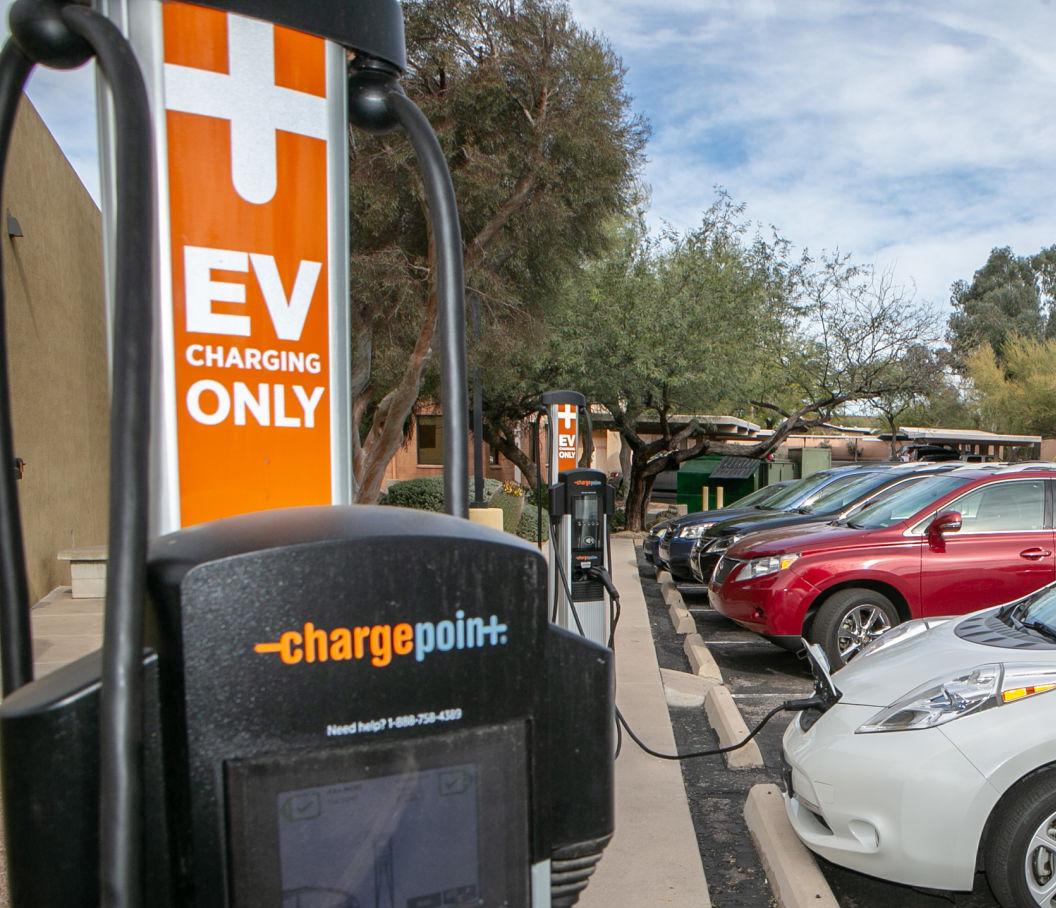Tucson Electric Power Co. customers who own electric cars soon will be able to save a little on their power bills by charging their cars on off-peak hours, under a plan approved by state regulators.
The Arizona Corporation Commission this week approved a statewide implementation plan for electric vehicle charging, allowing utilities to help build EV charging infrastructure and propose pilot programs to encourage EV use.
Though the rates have been approved, it will still take several weeks for TEP to set up and test the new rates in its billing systems and make them available to customers, TEP spokesman Joe Barrios said.
The commission had previously approved a general statewide electric-vehicle policy for utilities and had ordered TEP to propose a special rate plan for EV owners.
The utility’s proposed EV rates are optional and are based on existing “time-of-use” rates, which offer higher rates during hours of peak demand and lower rates off-peak.
TEP’s two new EV rates are both time-of-use rates that offer a new “super off-peak” period with lowest rates from 10 p.m. to 5 a.m. to reward EV owners for charging when demand is slack.
One of the plans features a so-called “demand charge,” which is based on kilowatts used during a period of highest usage during a month. That plan comes with a lower rate per kWh, but customers must carefully manage their on-peak use to avoid a high monthly demand charge.
TEP says that based on the average monthly cost of charging an EV, home customers would pay about $17 to $19 per month to charge their cars under the new super off-peak, time-of-use rate with a demand charge and $28 to $32 under the EV time-of-use rate without a demand charge.
By comparison, TEP says it costs customers on its standard time-of-use rate about $30 to $34 to charge their EVs, while customers on its basic residential plan spend about $33 to $36.
Under the approved plans, state-regulated utilities can offer special rates for electric-vehicle charging and support development of public charging networks.
Utilities are required to submit proposals for EV pilot programs to the Corporation Commission by Sept. 1 and by the end of the year, they must file comprehensive EV plans, including pilot programs, budgets, goals and progress reports.
“The company is looking for the best, most cost-effective ways to build robust EV programs,” Barrios said.
The policy also allows the power companies to recover their “prudent costs” for investments in EV charging systems through their general rates, like other capital investments.
TEP has said it plans to spend some $8 million on public EV charging systems and wants to recover those costs from ratepayers down the road.
Opponents of the EV policy included AARP Arizona, which argued that its members can’t afford subsidizing electric vehicles they may not drive, and the Western States Petroleum Association, which said the purported benefits of EVs haven’t been proven.
Other critics said the utilities’ involvement could compete unfairly with private EV charging-system developers.
To qualify for TEP’s new EV rates, a customer must have a highway-approved battery electric vehicle or plug-in hybrid electric vehicle and appropriate home charging equipment.
TEP also had proposed a pilot EV incentive program as part of its 2018 energy-efficiency plan — belatedly approved by regulators in February — which offers rebates to customers to help state-regulated utilities meet energy-saving goals.
In TEP’s 2018 plan, about $2.2 million of revenue was shifted from other home incentive programs for an EV pilot program that would provide rebates of up to $500 for customers who install charging equipment at home and $100 to homebuilders for each home they make charger-ready.
But those incentives were not part of the rate order approved by the Corporation Commission on Wednesday, and TEP is still deciding how to roll out a pilot incentive program, Barrios said.
The rate order specifies that the $2.2 million earmarked for EV programs, or any remaining funds, will revert to existing energy-efficiency programs on March 1.
The Corporation Commission also on Wednesday approved TEP’s 2019 and 2020 energy-efficiency plans, agreeing to keep the annual program budget flat at about $23 million.





